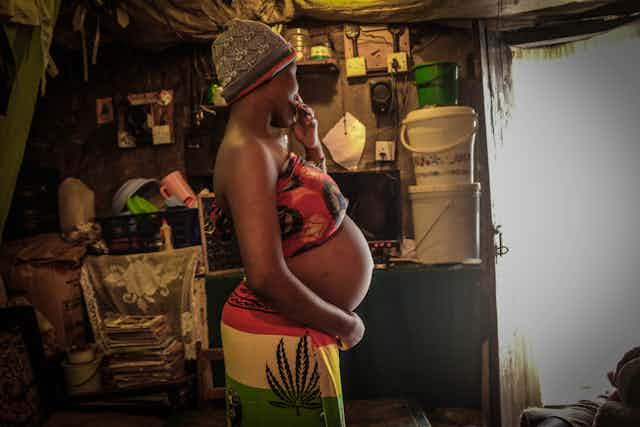The rates of adolescent pregnancies in sub-Saharan Africa are among the world’s highest. The adolescent birth rate is as high as 139 per 1,000 girls in Tanzania and 96 per 1,000 in Kenya. This is significantly higher than developed countries like Canada where the adolescent birth rate is 8 births per 1,000 girls.
Adolescent pregnancies are a major public health concern. They can lead to unplanned parenthood and poor health outcomes for young women. Early, unintended pregnancy can add stress to the normal physiological and behavioural changes of this time of life. In sub-Saharan African countries, adolescents and young women may also experience poor antenatal service provision, blatant social and gender discrimination, violence and stigma.
All these experiences have impacts on mental and physical health.
Despite the high incidence of adolescent pregnancy and the risks it poses, there isn’t much data on maternal mental health in this age group in sub-Saharan Africa. My colleagues and I performed a systematic review of the evidence about mental health problems and service delivery gaps experienced by adolescent girls and young women in the region.
Our review aimed to show where more information is needed, fill some gaps and stimulate efforts to improve the outcomes of vulnerable adolescents.
What we found
We looked at research done between 2007 and 2020. The studies in our review highlighted a list of challenges.
Adversities and stress during pregnancy are linked to mental disorders. Depression and anxiety are the most common.
Pregnant adolescents and young women go through a unique combination of hormonal changes and stressful experiences. These may trigger adverse outcomes. Girls may have to leave school and find it difficult to go back after their child is born. Family relationships may be difficult or even abusive. These young women are also at risk of future unplanned pregnancy. Their society may judge them harshly and discriminate against them. And they are expected to “be an adult” before they are ready.
Financial dependence, complex relationships and stigma about youth pregnancy and mental disorders make it harder to get healthcare. The mental health services that are available for adults may not be able to help pregnant adolescents and young women.
In the research we reviewed, depression and general psychological distress were frequently reported as having an impact on young mothers. These effects may be more significant and prolonged among younger girls and adolescents than older women.
Adolescence is a life stage that is heavily influenced by peer interaction. That’s why social rejection and exclusion may be especially harmful to mental health among pregnant adolescents.
Early motherhood can put a young woman’s dreams out of reach. This can be disheartening for those who have yet to experience independence.
Social isolation and rejection, limited opportunities, stalled careers and education, and limited access to healthcare are all indicators of significant concerns to come.
The impact on this population is disproportionate. But research and implementation of evidence-based solutions are scarce in the African region.
We found that the studies covering this population didn’t closely examine the relationships between gender, cultural norms, stereotypes and the challenges or distress these young women experience. The mental health consequences of restrictive gender and cultural norms, female oppression and exploitation, and patriarchal power structures in the sub-Saharan African region merit further investigation in general.
Implications
Future studies among pregnant adolescents and young women should evaluate common mental health disorders in adolescent populations, such as trauma, substance use, self-harm, stress, and suicidal tendencies using validated and culturally contextualised approaches.
There is also a need for assessments of common maternal mental health conditions, such as postpartum psychosis, anxiety, and bipolar disorders. Assessing quality of life, resilience, multidimensional disabilities and functional impairments would also help chart the psychological well-being of pregnant adolescents and young women.
Clinicians, researchers and advocates working with young people must design effective interventions. These should be led by young mothers and pregnant adolescents and key stakeholders, and tailored to this unique group.
Improving comprehensive and integrated mental health services within schools, communities, and healthcare settings to address the needs of this group is critical. Quality care must be provided in a youth-friendly manner that protects dignity and privacy.
Integrating tailored mental health services for this group of young women can enhance maternal and child health and strengthen health systems in the region. Investment is urgently required to advance the well-being of adolescents and young women as part of the current sustainable development agenda in sub-Saharan Africa.

